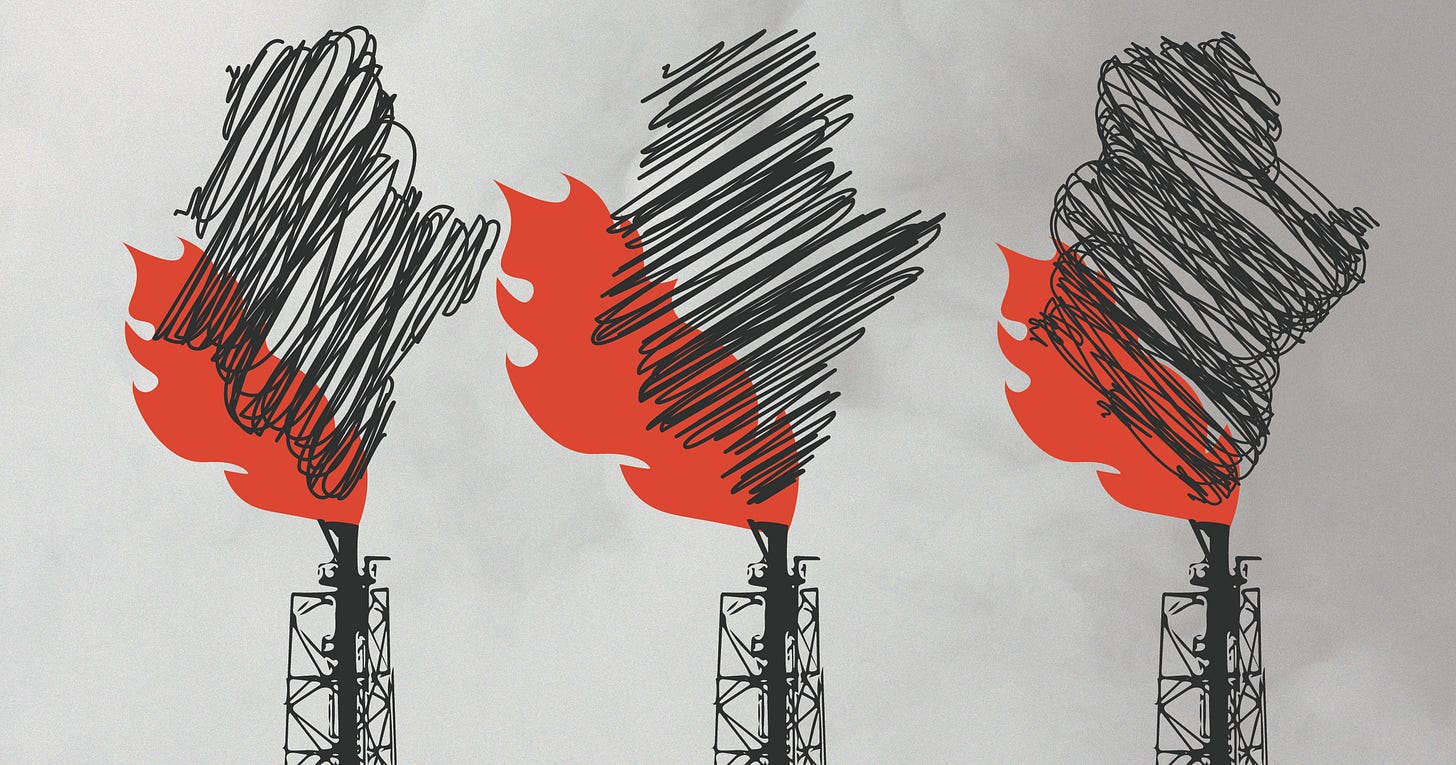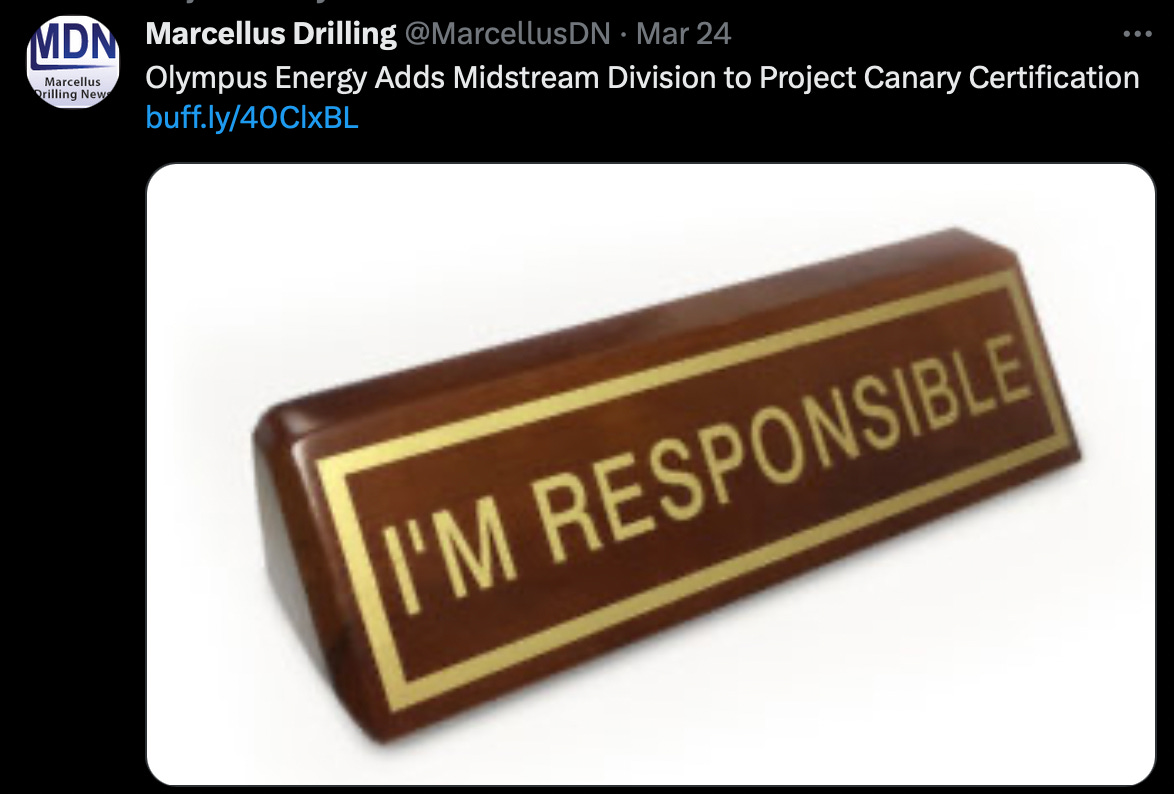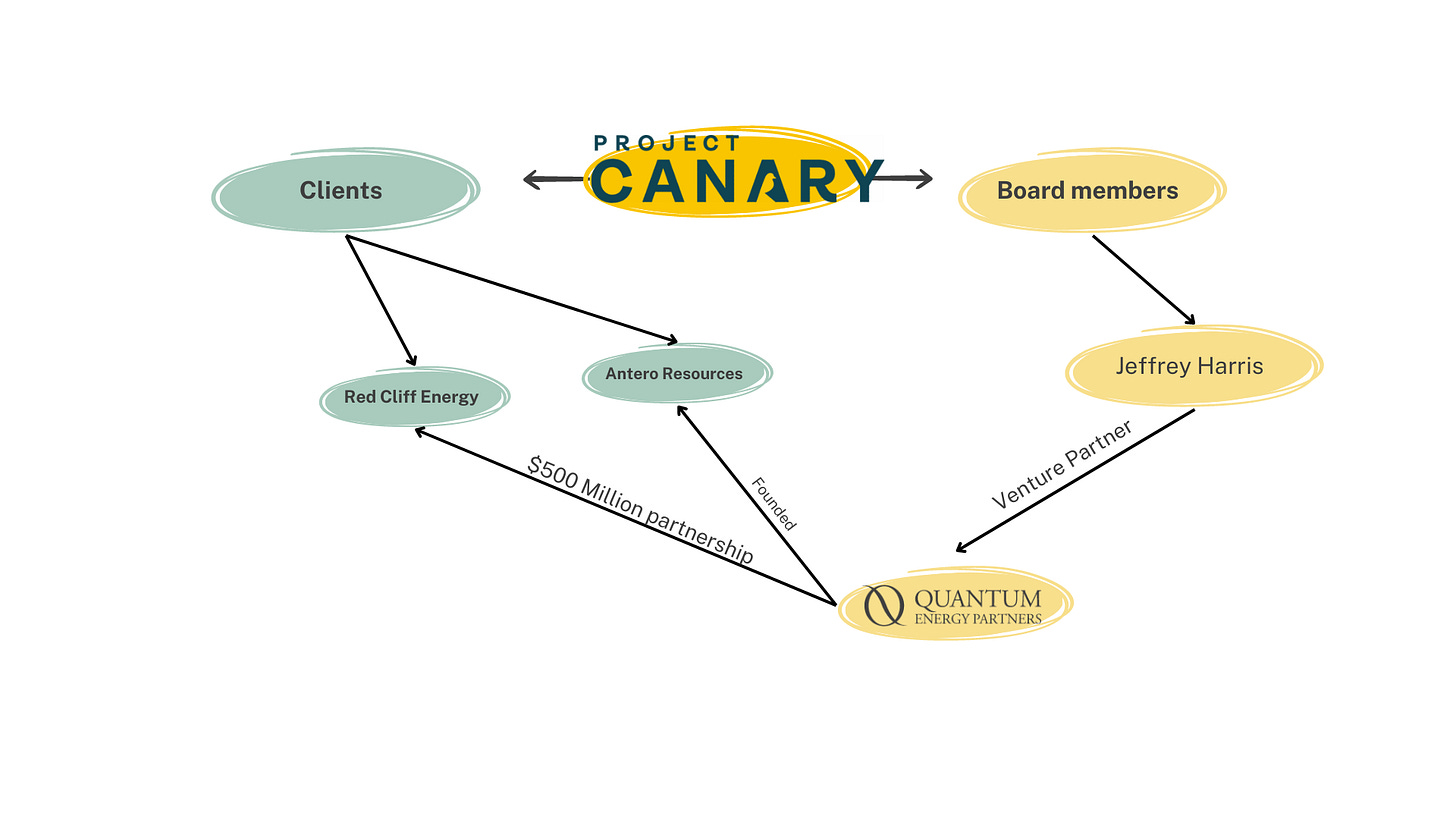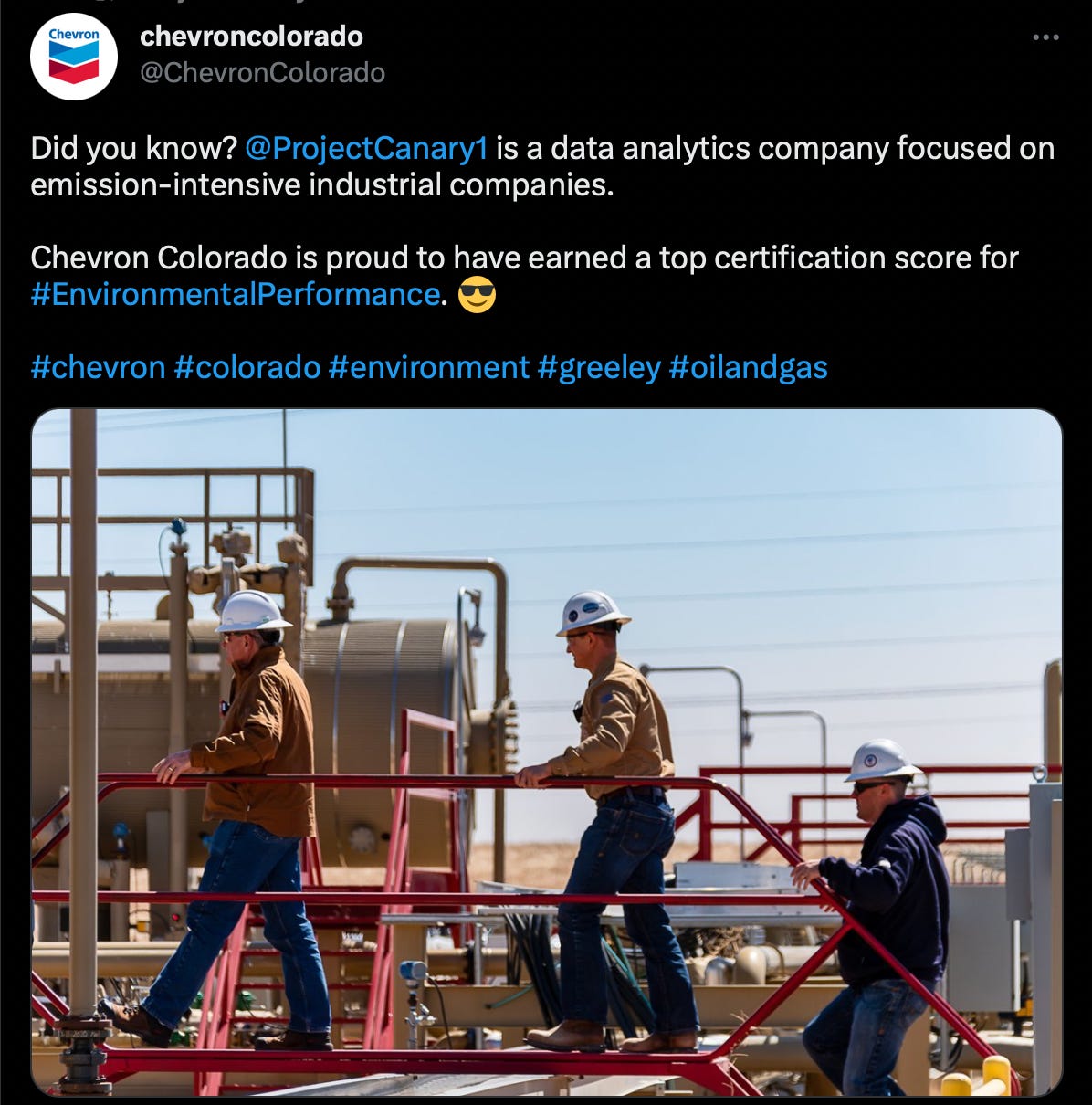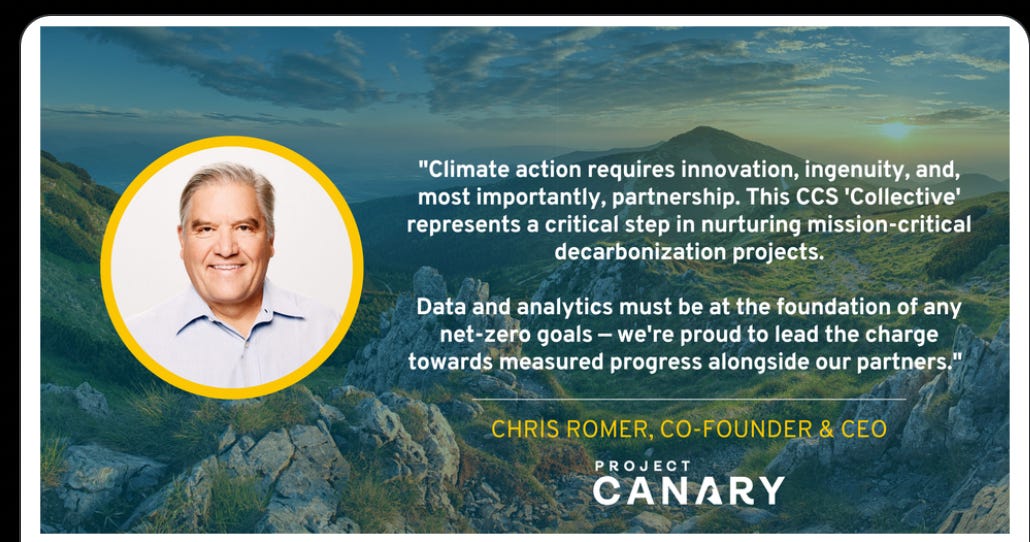"Responsibly sourced gas" — the latest fossil fuel deception
A new report from Earthworks and Oil Change International shows how the gas industry is selling “solutions” to its own methane pollution.
Emily Sanders is senior reporter for ExxonKnews.
The fossil fuel industry’s chronic methane pollution — a major contributor to climate change, and significantly more harmful than CO2 in the short term — has gone egregiously underreported and unchecked, according to a growing body of research and evidence. A new scientific study published Monday found that methane emissions from the oil and gas industry were 70% higher than the EPA’s estimates between 2010 and 2019.
But in recent years, gas companies have been assuring governments and importers that there’s nothing to worry about if they buy “responsibly sourced gas” (RSG).
What is RSG? A relatively new but increasingly popular practice in oil and gas markets, companies are paying supposedly independent firms to monitor their operations and “certify” their gas as low on methane emissions. After the gas is certified, it can be marketed as “responsibly sourced” and sold at a premium.
But a new report, also published Monday by advocacy groups Earthworks and Oil Change International, say the process is a fiction spun by polluters increasingly desperate to escape accountability for selling a product that’s destroying the climate.
The researchers spoke with industry experts and surveyed oil and gas operations across Colorado that were monitored by Project Canary, a leading “gas certification” company whose CEO has stated that “we are going to be able to solve climate change with measurement.” What they found was a scheme rife with financial conflicts of interest, faltering technology that failed to accurately assess pollution, and misleading claims meant to disguise harmful operations as environmentally sound. (If all of that sounds familiar, it’s because Big Oil has used a similar playbook to greenwash its fossil fuel business multiple times before.)
My interview with two of the report’s authors — Josh Eisenfeld, Corporate Accountability Communications Campaigner at Earthworks, and Lorne Stockman, Research Co-Director at Oil Change International — is below, edited for length and clarity.
EK: How and why did companies decide to start “certifying” gas?
LS: There were a couple of drivers: one is the reputation that U.S. gas producers have had since the fracking boom for emitting just absolutely massive amounts of methane. This has been a reputational risk for gas producers and gas traders for quite some time. As the technology has been developing to detect and measure those emissions, I think the industry saw an opportunity to exploit the concern around methane emissions in order to make a profit.
Methane emissions have kind of become a hot button issue in the global climate talks, so U.S. companies who are very much dependent now on the export trade are rushing into this to make sure that climate conscious LNG (liquid natural gas) importers are not rejecting U.S. gas because of its association with high methane emissions. But as the report exposes, at this point certified gas is very much operating in a black box. There are different standards across different companies, and it’s very difficult for people outside of the system to get good information about what’s going on.
EK: How does this process work — who decides what the standards for certification will be, and how is certification data verified?
JE: Right now, there are no standards — or really, whoever wants to set standards is setting standards. That can create a confusing landscape and it can really devalue what basic terminology we did have to talk about how to deal with pollution. Right now, there are really three players in the certified gas world — Project Canary, MiQ, and Equitable Origin. Project Canary is the only one that not only certifies gas, but sells its own emissions monitors to the companies it certifies, which makes this extremely questionable — especially in a scenario where there’s no standards.
As of right now, it’s not clear if anyone is verifying Project Canary’s certifications at all. Realizing that was sort of the beginning of this report — a lot of bold claims were being made, and the more we asked experts, the more we tried to access information and could not, the more it became clear that we needed to at least try to verify what we could. This report hopefully shines the light on something that’s going completely under the radar and also having pretty big global implications. If we don’t act on this, we could be allowing important decisions to be made without any evidence that this “certification” stamp of approval is real.
EK: Can you talk more about Project Canary’s ties to the gas companies they certify?
LS: We started looking at board members and their advisory board and there’s a number of folks in there like Lord [John] Browne, who used to be the CEO of BP, and others that have connections to the industry. We started digging a little bit deeper and found that one of their board members, a guy called Jeffrey Harris, founded an investment advisory firm that are quite big investors in a company called Quantum Energy Partners, which is a private equity firm that invests in companies in the U.S. And several of the companies that Quantum invests in are customers of Project Canary. Project Canary is monitoring and certifying their operations. Then we found two of their advisory board members also with investments or interests in companies that Project Canary certifies.
We feel that there should be complete independence between Project Canary and the companies it serves — it’s just unacceptable for Project Canary board members and advisory board members to actually have financial interests in companies that they’re certifying as having cleaner gas than competitors. There’s a profit incentive there, and there certainly seems to be some conflict of interest going on.
EK: What did your team find while surveying the gas operations being monitored by these certification companies?
JE: The Earthworks team did a total of 77 site visits over seven months, and found 22 new pollution events at these sites. What we found was that all 22 times, the monitors that were on those sites failed to capture the pollution that our OGI [optical gas imaging] cameras captured. We have some serious capability questions about the Project Canary monitors we surveyed. Everything that we saw was backed up by other experts in the field as significant pollution events that one would reasonably expect to be captured by a monitor that claimed to be detecting pollution.
EK: What type of pollution are the communities neighboring these sites being exposed to?
JE: Let’s start with benzene — there’s no known safe level of benzene. If it’s in the atmosphere it’s unsafe, and causes cancer. There are also a number of dangerous volatile organic compounds (VOCs) that come off of oil and gas [operations]. And then of course there’s methane, the second leading climate contributor and one of the fastest growing. These certification programs were created to basically say this pollution wasn’t happening, or to certify that it was happening at lower rates. But what we call into question here is whether they really have the technology capabilities to make those types of certifications.
EK: What is the role these companies claim gas certification is playing to limit their pollution, versus the role it’s actually playing?
JE: One of the ways these certifications are used by companies is to represent that they are taking action and turning the page on climate. We know this industry has a history of disinformation, of hiding the truth, hiding the science, and really just dragging their feet on any sort of action. We also know they have an image problem, and companies like Project Canary have been pretty forthright about their want to help them solve that image problem. That is concerning when you look at what we’ve found and how bold their claims are without much substantiation.
There is a need to hold companies accountable to whatever commitments they’re making, but that accountability can’t come from a black box. The data behind those claims needs to be transparent and understandable.
LS: There also seems to be a fundamental sort of denial of what it really takes to align with 1.5 degrees or the Paris Agreement. What Project Canary is pushing in its statements and what it says on its website is this idea that getting your gas certified is pretty much the be all and end all of what a company needs to do to address climate change. And that’s just a fundamental denial of climate science. Reducing methane emissions is absolutely fundamental and needs to happen this decade, but that doesn’t mean gas production and consumption can grow — gas production needs to decline this decade as well, and even more dramatically in the coming decade. Any climate scenario aligned with 1.5 degrees will make those two things very clear.
EK: Are there any other important takeaways from this research that you’d like readers to come away with?
LS: One of the other things to point out is the connection this has to other false climate solutions, like carbon capture and storage (CCS) or fossil hydrogen, so-called “blue” hydrogen. Project Canary is very keen to get into that space as well, and is claiming that they are capable of monitoring CCS operations and certifying those as well. This is a slippery slope — they’re starting in this methane reduction space but getting ready to get into these other false solutions that the oil and gas industry is very strongly pushing. It’s absolutely fundamental that we start holding these guys to account.
***
To bring more accountability into this space, Earthworks and Oil Change International recommend that gas certification include an independently accredited transition pathway away from gas; transparency and publicly available monitoring data that are subject to independent, peer-reviewed analysis; clear definitions and regulations for certified gas backed up by publicly accessible raw data; and caution from buyers and investors of misleading industry claims.
Read more in the full report, “Certified Disaster: How Project Canary & Gas Certification are Misleading Markets and Governments.”
ICYMI News Roundup

